英语四级口语考试练对话记单词(6)
- 格式:docx
- 大小:37.63 KB
- 文档页数:5
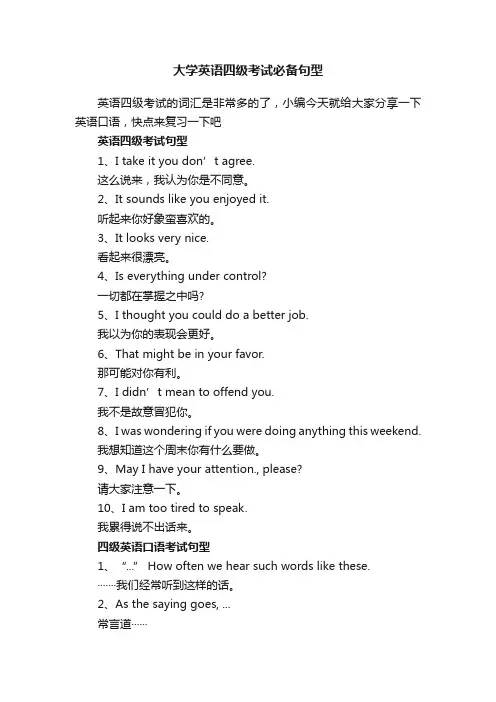
大学英语四级考试必备句型英语四级考试的词汇是非常多的了,小编今天就给大家分享一下英语口语,快点来复习一下吧英语四级考试句型1、I take it you don’t agree.这么说来,我认为你是不同意。
2、It sounds like you enjoyed it.听起来你好象蛮喜欢的。
3、It looks very nice.看起来很漂亮。
4、Is everything under control?一切都在掌握之中吗?5、I thought you could do a better job.我以为你的表现会更好。
6、That might be in your favor.那可能对你有利。
7、I didn’t mean to offend you.我不是故意冒犯你。
8、I was wondering if you were doing anything this weekend.我想知道这个周末你有什么要做。
9、May I have your attention., please?请大家注意一下。
10、I am too tired to speak.我累得说不出话来。
四级英语口语考试句型1、“...” How often we hear such words like these.·······我们经常听到这样的话。
2、As the saying goes, ...常言道······3、Some people may neglect that in fact...事实上,有些人忽略了这一点4、It is high time that...该是······的时候了5、I need your help.我需要你的帮助。
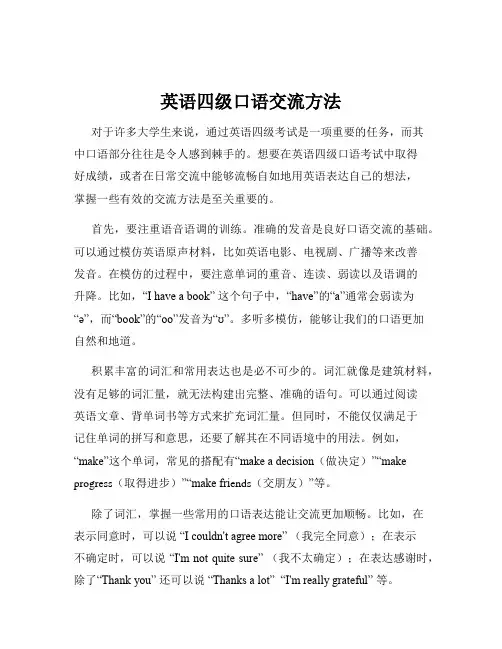
英语四级口语交流方法对于许多大学生来说,通过英语四级考试是一项重要的任务,而其中口语部分往往是令人感到棘手的。
想要在英语四级口语考试中取得好成绩,或者在日常交流中能够流畅自如地用英语表达自己的想法,掌握一些有效的交流方法是至关重要的。
首先,要注重语音语调的训练。
准确的发音是良好口语交流的基础。
可以通过模仿英语原声材料,比如英语电影、电视剧、广播等来改善发音。
在模仿的过程中,要注意单词的重音、连读、弱读以及语调的升降。
比如,“I have a book” 这个句子中,“have”的“a”通常会弱读为“ə”,而“book”的“oo”发音为“ʊ”。
多听多模仿,能够让我们的口语更加自然和地道。
积累丰富的词汇和常用表达也是必不可少的。
词汇就像是建筑材料,没有足够的词汇量,就无法构建出完整、准确的语句。
可以通过阅读英语文章、背单词书等方式来扩充词汇量。
但同时,不能仅仅满足于记住单词的拼写和意思,还要了解其在不同语境中的用法。
例如,“make”这个单词,常见的搭配有“make a decision(做决定)”“make progress(取得进步)”“make fri ends(交朋友)”等。
除了词汇,掌握一些常用的口语表达能让交流更加顺畅。
比如,在表示同意时,可以说“I couldn't agree more” (我完全同意);在表示不确定时,可以说“I'm not quite sure” (我不太确定);在表达感谢时,除了“Thank you” 还可以说“Thanks a lot” “I'm really grateful” 等。
语法的正确运用也是关键。
虽然口语交流中对语法的要求相对没有书面语那么严格,但基本的语法错误还是会影响交流的效果。
要特别注意时态、单复数、主谓一致等常见的语法点。
比如,“He go to school by bike every day” 这个句子中,“go”应该改为“goes”,因为主语“he”是第三人称单数。
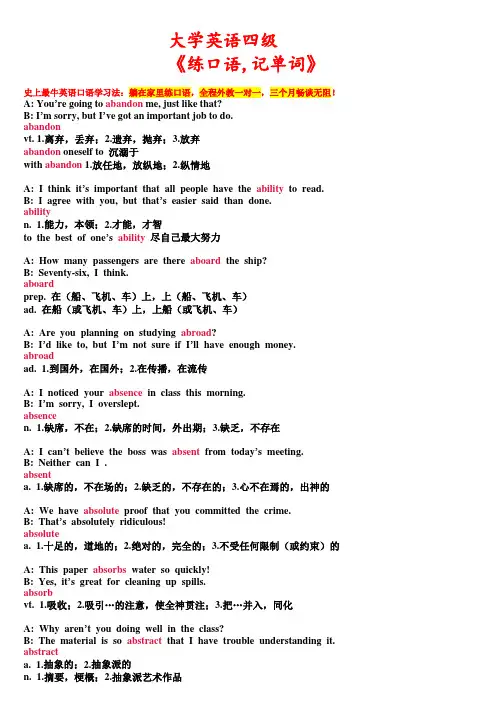
大学英语四级《练口语,记单词》史上最牛英语口语学习法:躺在家里练口语,全程外教一对一,三个月畅谈无阻!A: You’re going to abandon me, just like that?B: I’m sorry, but I’ve got an important job to do.abandonvt. 1.离弃,丢弃;2.遗弃,抛弃;3.放弃abandon oneself to 沉溺于with abandon 1.放任地,放纵地;2.纵情地A: I think it’s important that all people have the ability to read. B: I agree with you, but that’s easier said than done.abilityn. 1.能力,本领;2.才能,才智to the best of one’s ability 尽自己最大努力A: How many passengers are there aboard the ship?B: Seventy-six, I think.aboardprep. 在(船、飞机、车)上,上(船、飞机、车)ad. 在船(或飞机、车)上,上船(或飞机、车)A: Are you planning on studying abroad?B: I’d like to, but I’m not sure if I’ll have enough money.abroadad. 1.到国外,在国外;2.在传播,在流传A: I noticed your absence in class this morning.B: I’m sorry, I overslept.absencen. 1.缺席,不在;2.缺席的时间,外出期;3.缺乏,不存在A: I can’t believe the boss was absent from today’s meeting.B: Neither can I .absenta. 1.缺席的,不在场的;2.缺乏的,不存在的;3.心不在焉的,出神的A: We have absolute proof that you committed the crime.B: That’s absolutely ridiculous!absolutea. 1.十足的,道地的;2.绝对的,完全的;3.不受任何限制(或约束)的A: This paper absorbs water so quickly!B: Yes, it’s great for cleaning up spills.absorbvt. 1.吸收;2.吸引…的注意,使全神贯注;3.把…并入,同化A: Why aren’t you doing well in the class?B: The material is so abstract that I have trouble understanding it. abstracta. 1.抽象的;2.抽象派的n. 1.摘要,梗概;2.抽象派艺术作品vt. 1.做…的摘要;2.提取,抽取in the abstract 抽象地,在理论上A: Labor is an abundant resource here.B: One of many abundant resources, I’d like to point out.abundanta. 1.大量的,充足的;2.(in)丰富的,富裕的A: I hate to see the abuse of animals.B: It makes me sick.abusen. 1.滥用,妄用;2.虐待,伤害;3.辱骂,毁谤vt. 1.滥用,妄用;2.虐待,伤害;3.辱骂,毁谤A: I really dislike reading academic books.B: That may be so, but reading them is an important way to expand your knowledge. academica. 1.学校的,学院的;2.学术的;3.纯理论的,不切实际的n. 大学教师A: The academy is an important part of the education system.B: I couldn’t agree with you more.academyn. 1.研究院,学会;2.(中等以上)专门学校A: Look how fast that car can accelerate!B: I’ve never seen anything like it .acceleratev. (使)加快,(使)增速A: I’m sorry, I’m having a little trouble understanding your accent.B:I’ll try to speak more clearly.accentn. 1.口音,腔调;2.重音,重音符号vt. 重读A: How’s work?B: I feel like I’m finally gaining my co-worker’s acceptance..acceptancen. 1.接受,接纳;2.赞同,承认;3.容忍A: I wish I had access to the public library.B: it’s easy! Just go and get a card.accessn. 1.通道,入口;2.接近,进入;接近(或进入、享用)的机会vt. 存取(计算机文件)A: How did you two meet?B:To tell you the truth, it was completely accidental.accidentala. 意外的,偶然(发生)的A: What sort of accommodation can you supply for me?B: We’ve got a beautiful two-room double with a bath an shower.accommodationn. [常pl.] 住处,膳宿A: Would you be willing to accompany me to the party tonight?B: Sure , I’d love to .accompanyvt. 1.陪伴,陪同;2.伴随,和…一起发生;3.为…伴奏(或伴唱)A: What kind of job do you think I should get?B: It all depends on what you want to accomplish in your life.accomplishvt. 达到(目的),完成(任务),实现(计划、诺言等)A: The numbers in this table don’t seem to be in accord with reality.B: I know, but these are the figures that we came up with.accordn. 1.一致,符合;2.(尤指国与国之间的)谅解,协议vi. (with)相符合,相一致,相和谐vt. 授予,赠与,给予of one’s own accord出于自愿,主动地in accord with 与…一致,与…相符合with one accord一致地,一致同意地A: Why didn’t you sign the contract?B: Because that company’s behavior is not in accordance with international law. accordancen. 一致,和谐,符合in accordance with 与…一致,依照,根据A: When should I make my presence known?B: Wait for my instructions and then proceed accordinglyaccordinglyad. 1.照着,相应地;2.因此,所以,于是A: Why are you holding me in this jail cell?B: We’d like to hear your account of the events of last night.accountn. 1.记述,描述,报告;2.帐,帐户;3.解释,说明vi. 1.(for)说明…的原因,是…的原因;2.(在数量、比例方面)占of no account不重要的on account of 为了…的缘故,因为,由于on no account绝不,绝对不take account of 考虑到,顾及,体谅take…into account见take account of :考虑到,顾及,体谅A: My accountant thinks she can save me lots of money on my taxes this year. B: That sounds great!accountantn. 会计人员,会计师A: You shouldn’t let the dirty dishes accumulate in the sick!B: I know, I should wash them right away.accumulatevt. 堆积,积累,积聚vi. 累积,聚积A: When shooting a gun, accuracy is very important.B: You only need to tell me that once.accuracyn. 准确(性),精确(性)A: If the weatherman’s predictions are accurate, it should rain tomarrow. B: I hope not. Then we’d have to reschedule our baseball game.accuratea. 1.正确无误的;2.准确的,精确的A: How dare you accuse me of stealing your computer?B: I’m sorry, but you were the only one who had access to it.accusevt. 指控,控告,指责A: I’m not really accustomed to the style of the new boss.B: It’ll take us al some time to get used to the change.accustomeda. 1. (to)习惯于…的,适应了的;2. 通常的,惯常的A: The new testing system rewards students based on achievementB: Well, what was the old system like?achievementn. 1.成就,成绩;2.达到,完成,实现A: Be careful! This acid can burn through your skin!B: Maybe I should wear gloves.acidn. 酸,酸性物质a. 1.酸的,酸味的;2.尖刻的,刻薄的A: I’m so embarrassed that I don’t know what to do.B: You should just acknowledge your mistake and move on.acknowledgevt. 1.承认,承认…的权威(或主张);2.告知收到,确认;3.对…表示谢忱,报偿A: Was that your girlfriend?B: No, we’re not even good friend. She’s really just an acquaitance acquaintancen. 1.相识的人,熟人;2.认识,相识,了解A: What do you think is the best way to acquire knowledge about fishing? B: Go fishing!acquirevt. 1.取得,获得;2.学到A: The acquisition of wealth should not be the only goal of your life.B: I know, but I still would have liked to have gotten a raise.acquisitionn. 1.取得,获得,习得;2.获得物,增添的人(或物)A: How many acres of land are you hoping to bay?B: Anywhere between ten and twenty.acren. 英亩A: If you really like the girl, then you should take actionB: But I get nervous every time I talk to her .actionn. 1.行动,行动过程;2.已做的事,行为;3.作用;4.情节out of action不(再)起作用,不(再)运转A: What would you say is your favorite activity ?B: I’d have to say bowling.acrivityn. 1.活动,行动;2.活跃,活力A: Why do you think he is so successful?B: His acute sense of reason puts him a level above everyone else.acutea. 1.严重的,激烈的;2.敏锐的;3.(疾病)急性的;4.尖的,锐的A: That is the silliest ad I have every seen!B: Why would anyone want to buy that product?adn. 见advertisementA: If you want to survive in this business, you’ve got to learn to how to adaptB: I’m doing the best I can.adaptvt. 1.使适应,使适合;2.修改,改编vi. (to) 适应A: How are you going to have room for the new baby?B: We’re going to build an addition onto our house.additionn. 1.加,加法;2.增加的人(或物)in addition 另外,加之in addition to 除…之外(还)A: Do you have any additional questions?B: No, thanks, you’ve answered them all.additionala. 添加的,额外的,另外的A: If we can’t find adequate housing in the city, we’re going to have to move to another state. B: That would really be a pit.adequatea. 1.充足的,足够的;2.适当的,胜任的A: How was the concert?B: I don’t know if I can even find the right adjective to describe it!adjectiven. 形容词A: I’m sure it’s just a matter of time before you find a job.B: Maybe I need to adjust my attitudeadjustvt. 1.校正,校准,调节;2.调节,改变…以适应vi. (to)适应A: I’ve just about had it with the administration !B: Really? What’s the problem?administrationn. 1.管理,经营,支配;2.管理部门,行政机关,政府;3.实行,执行A: I applied to six school, and got four offers of admission .B: Congratulations!admissionn. 1.准许进入,准许加入;2.入场费,入场券;3.承认,供认A: I think maybe we should adopt a child.B: I’m not sure if we can afford it.adoptvt. 1.收养;2.采取,采纳,采用;3.正式通过,批准A: Sometimes I get tired of being an adult. And want to just play like a child. B: I think we all feel that way sometimes.adultn. 成年人(或动物)a. 1.成年的,充分长成的;2.成年人的,适宜于成年人的A: Are you going to sign up for the advanced course, or the beginner one?B: I think I might sign up for the intermediate course.advanceda. 1.超前的,先进的;2.高级的,高等的;3.年迈的,后阶段的A: Why did your team lose the game?B: They had a big advantage over us, being so much taller.advantagen. 1.优点,有利条件,有利因素;2.利益,好处take advantage of 利用,占…的便宜to advantage有力地,使优点突出地A: Do you know what an adverb is ?B: I think I remember from school that it is usually a word that modifies a verb. adverbn. 副词A: If we want our magazine to be successful, we need to find advertisers.B: But who would want to advertise I a magazine about potatoes?advertisevt. 1.为…做广告,宣传;2.(在报刊,电视,广播等中)公告,告布vi. 登广告,做广告,登公告A: It’s imperative that we build our brand name.B: Well, if we want to do that, we’re going to need a killer advertisement. advertisementn. 1.广告,公告,启事;2.广告活动,宣传A: I’ve decided to quit my job.B: I really don’t think that’s an advisable course of action.advisablea. 可取的,适当的,明智的A: What did the doctor say?B: She advocated that I quit smoking.advocatevt. 拥护,提倡,主张n. 1.拥护者,提倡者;2.辩护者,律师A: It’s important to remember that your own actions affect the lives of others.B: Thanks for reminding me.affectv. 影响A: Why do you think he ‘s angry all the time?B: Maybe his mother didn’t show him enough affection when he was a child.affectionn. 喜爱,感情,爱慕之情A: So, you went to the concert. Then what?B: Afterwards, he drove me home and kissed me goodnight.afterward(s)ad. 以后,过后,后来A: Do you know of a good travel agency?B: We were very happy with the one that organized our trip to the Bahamasagencyn. 1.代理行,经销处;2.(政府等的)专业行政部门A: Would you mind helping me plan the agenda for tomorrow’s meeting?B: Sure, no problem.agendan. 议事日程A: What do you do for a living?B: I’ve been a real estate agent for the past 15 years.agentn. 1.代理人,代理商,经纪人;2.政府特工人员,政府代表;3.动因,原因;4.剂A: Why didn’t you hire the candidate from Michigan?B: I was really turned off by his aggressive manner.aggressivea. 侵犯的,侵略的,挑衅的;2.敢作敢为的,有进取心的A: This software has been a great aid in completing my homework.B: It’s amazing what computers can do.aidn. 1.帮助,援助,救助;2.助手,辅助物,辅助手段vt. 帮助,援助,救助A: Before boarding the aircraft, remember to remove anything sharp from your luggage. B: Don’t worry, I’ll remember.aircraftn. 飞机,航空器A: Do you prefer to fly small airlines or large ones?B: I fly whichever will sell me the cheapest ticket.airlinen. [常pl.] 航空公司A: I’m worried that my sickness will become serious.B: Relax. A minor sore throat is no cause for alarm.alarmn. 1.惊恐,忧虑;2.警钟,报警器,闹钟;3.报警vt. 使惊恐,使担心A: Can I get you a beer?B: No thanks. If I drink too much alcohol, my face turns red.alcoholn. 含酒精的饮料,酒精A: Be sure to stay alert when you’re walking alone at night.B: I’ll be fine. I’ve lived in the city all of my life.alerta. 警觉的,留神的,注意的vt. 1.向…报警,使警惕;2.使认识到,使意识到n. 1.警戒(状态),戒备(状态);2.警报on the alert警戒着,随时准备着,密切注意着A: You two look almost exactly alike!B: Well, we’re twins.alikea. 同样的,相象的ad. 1.一样地,相似地;2.同样程度地A: Exactly how is an alliance with their company in our best interests?B: The chief advantage is that we can consolidate our production lines. alliancen. 结盟,联盟A: Why should I give you a raise in your allowance?B: Because I do more chores now than I used to .allowancen. 津贴,补贴,零用钱make allowance(s) for 1.考虑到,顾及;2.体谅,原谅A: They’ve been our allies for fifteen years, and I think we should help them B: But sometimes you’ve got to abandon a sinking ship.allyn. 1.同盟国,同盟者;2.支持者v. (使)结盟,(使)联合A: How do I get to the bank?B: Just follow the road that runs alongside the river.alongsidead. 在旁边,沿着边,并排地prep. 1.在…旁边,沿着…的边;2.和…在一起A: How many vowels are there in the English alphabet?B: Five, I think.alphabetn. 字母表A: I’m trying to find a way to alter my image.B: You could start by cutting your hair.alterv. 改变,改动,变更A: Isn’t there an alternative to moving to another country?B: Not if we want to survive financially.alternativea. 1.两者择一的,供选择的,供替代的n. 1.取舍,抉择,供选择的东西;2.选择的自由,选择的余地A: I’m having a strong reaction to the high altitude of the mountain.B: Rest for a few days, and I’m sure you’ll be fine.altituden. 1.高度,海拔;2.[pl.]高处,高地A: What are you going to do with all of those aluminum cans?B: Recycle them.aluminium= aluminumn. 铝A: You are quite the golfer!B: I’m just an amateur, but I try to practice a lot.amateurn. 1.业余爱好者,业余运动员;2.外行,粗通某一行的人a. 1.业余爱好的,业余(身份)的A: This magician we’re going to see will amaze you with some of his tricks.B: We’ll see. I’m not easily amazed.amazevt. 使大为惊奇,惊愕A: When you go abroad, you should remember that you’re acting as an ambassador for your co unty.B: I’m not so sure about that. As far as I’m concerned, I’m just representing myself. ambassadorn. 大使,使节,派驻国际组织的代表A: I wish I still had the ambition of my youth.B: I like you just the way you are.ambitionn. 1.抱负,雄心,野心;2.企望得到的东西A: If the ambulance had gotten here earlier, his life might have been saved.B: Now is not the time to place blame.ambulancen. 救护车A: I really hate him.B: Amid all of the things you hate about him, he must have at least some qualities that you fin d endearing.amidprep. 在…中间,在…之中,被…围绕A: What’s the best way to lose weight?B: Just remember that what you eat is more important than the amount you eat.amountn. 1.量,数量,数额;2.总额,总数vi. 1.(to)合计,共计;2.(在意义、价值面)等同,接近A: I was just trying to amuse you .B: Well, I didn’t think it was funny.amusevt. 1.逗乐,逗笑;2.给…提供娱乐(或消遣)A: What do you think about the country’s economic situation?B: I’d really need to do some further analysis before I could give you an answer on that. analysisn. 分析,分析报告A: If you had properly analyzed the situation a year ago, you might not be bankrupt today. B: Thanks for the advice, but it comes a little too late.analyse = analyzevt. 分析,细察,细查A: Where were your ancestors from?B: They were from various different countries in Europe.ancestorn. 1.祖宗,祖先;2.原型,先驱A: You’ve really been an anchor for me during this past year of hardship, and I want to say t hink you .B: It’s been my pleasure.anchorn. 1.锚;2.给人安全感之物(或人)vt. 1.抛(锚),泊(船);2.把…系住,使固定;3.担任(电视节目等的)主持人vi. 1.抛锚,停泊;2.固定,扎根A: Your car really looks ancient .B: Well, at least it still runs.ancienta. 1.古代的,古老的;2.年老的,看上去很老的A: I just can’t figure out how to save my marriage.B: Maybe you should try looking at the situation from a different angle .anglen. 1.角,角度;2.观点,立场vt. 1.把…放置成一个角度;2.使(新闻、报道等)带上倾向性angle for 谋取,猎取A: Why did you have to sit the game out.B: I twisted my ankle in practice.anklen. 踝,踝关节A: Do you think what today is .B: It’s our 50th wedding anniversary .anniversaryn. 周年纪念(日)A: Do you mind if I chew gum?B: Actually it’s really starting to annoy me.annoyvt. 1.使恼怒,使烦恼;2.打扰,干扰A: Are you going to go to Peter’s annual barbeque?B: This year I’ve got to stay home with the kids.annuala. 每年的,年度的,一年一次的n. 1.年报,年刊,年鉴;2.一年生的植物A: I am so sick of having ants in the kitchen.B: Maybe you should call the exterminator.antn. 蚂蚁A: I wish I could anticipate when it’s going to rain.B: Why don’t you just watch the weather report on the news?anticipatevt. 1.预期,期望,预料;2.先于…行动,提前使用A: This type of antique pot is very expensive.B: Well, then I don’t think I can afford it.antiquea. 古时的,古老的n. 古物,古玩,古董A: Whenever I have a math test, I have trouble controlling my anxiety.B: Everybody’s nervous-you need to learn how to relax.anxietyn. 1.焦虑,挂虑;2.渴望,热望A: Anyhow , you’re just as smart as he is .B: I know that , but I still feel inferior sometimes.anyhowad. 1.不管怎么说,无论如何,至少:2.不论用何种方法,无论从什么角度;3.随随便便地,杂乱无章地A: You really shouldn’t have fallen asleep during the lecture.B: Why not? I didn’t care what he was talking about anyway .anywayad. 1.不管怎么说,无论如何,至少:2.不论用何种方法,无论从什么角度A: Do you think it will be hard to be apart for so long?B: Not as long as we remember that we love each other.apartad. 1.[空间、时间方面]成距离,相间隔;2.分离,分开a. 分离的,分隔的apart from 1.除…之外(别无);2.除…之外(尚有)A: What have you been up to for the past few days?B: I’ve been trying to find an apartment in the city.apartmentn. 一套公寓房间,房间A: I think you owe me an apology .B: What!? You’re the one who parked illegally.apologyn. 道歉,认错,愧悔A: Why do you want to a divorce?B: It’s become quite apparent to me that you don’t care for me anymore.apparentn. 1.显然的,明白的,清晰可见的;2.表面上的,貌似(真实)的A: That type of shoe just doesn’t appeal to me.B: Say what you want, but I like them.appealn. 1.呼吁,恳求;2.感染力,吸引力;3.申诉,上诉vi. 1.呼吁,恳求;2.有吸引力,有感染力;3. 上诉,申诉;4.(to)诉诸,诉请裁决(或证实等)vt. 将…上诉,将…移交上级法院审理A: Why don’t we just stay home tonight?B: I feel like we should at least make an appearance at the party.appearancen. 1.出现,显露,露面;2.外观,外貌,外表to all appearances 就外表看来,根据观察推断A: You don’t seem to have much of an appetite tonight.B: Well, I had a big lunch.appetiten. 1.胃口,食欲;2.欲望A: Why do you want to be an actor?B: That’s easy. I crave the applause.applausen. 鼓掌,掌声A: How is your new house coming along?B: It’s completely furnished, except for the major appliances .appliancen. 器具,器械,装置A: Your example sounds great, but it’s not applicable to the situationB: I’m afraid I disagree with you on this one.applicablea. 1.可应用的,可实施的;2.适当的,合适的A: Do you think I’ll get the job?B: Well, you’re certainly not the most qualified applicant , but maybe they’ll hire you based on personality.applicantn. 申请人A: Are you planning on applying for graduate school this year?B: Not this year, but maybe the next.applyvi. 1.申请,请求;2.适用vt. 1.适用,运用,实施;2.涂,敷,施A: Who do you think the President should appoint as the new judge?B: Anybody will be better than the last guy!appointvt. 1.任命,委派;2.约定,确定,指定(时间、地点)A: I’ve got an appointment at four, but I could meet you for dinner at six.B: Okay, sounds great.appointmentn. 1.约会,约定;2.任命,委派;3.委任的职位A: I really appreciate all of your help.B: That’s what friends are for.appreciatevt. 1.重视,赏识,欣赏;2.为…表示感激;3.(充分)意识到,领会,体会vi. 增值A: I really like her, but I’m not sure how to approach her.B: Just walk up to her!approachv. 靠近,接近n. 1.靠近,接近,临近;2.途径;3.方式,方法A: Do you think this outfit is appropriate for the party?B: The invitation said, “wear what you want.”appropriatea. 1.适当的,恰当的vt. 1.私占,侵吞,挪用;2.拨出(款项等)供专用A: Do you like having your own place?B: Yes, I love it. I finally feel like I don’t need my mother’s approval .approvaln. 1.赞成,同意;2.批准,认可on approval (商品)供试用的,包退包换的A: You should know that I don’t approve of your dropping out of school.B: Do you think I care?approvevt. 1.赞成,同意;2.批准,核准,对…表示认可vi. (of )赞成,称许A: You don’t have to say exactly, just tell me your approximate age.B: I’m around forty.approximatea. 大概的,大约的,近似的vi. (to) 近似,接近vt. 1.近似,接近,估计A: I’m sorry you lost your job.B: I never thought, after all my years at the company, that they’d dismiss me in such an arbitrary manner.arbitrarya. 随意的,任意的;2.专断的,武断的,专制的A: What’s the first thing you’d do if you were going to build a house?B: I’d find a good architect , of course.architectn. 建筑师,设计师,缔造者A: I really hate the architecture of that building.B: Well, to each his own. I kind of like it.architecturen. 1.建筑学,建筑术,建筑业;2.建筑式样,建筑风格A: Look, I really don’t want to argue with you. Just give me the keys.B: Not if my life depends on it.arguev. 争辩,争论,辩论,说服A: Well, what are you going to do now?B: To be honest, I never thought this kind of situation would arise .arisevt. 产生,出现,发生;2.(from)(由…)引起,(由…)产生,起源于;3.起身,起床A: If you’re twenty five, and I’m ten years older than you, then how old am I?B: I’m really bad at arithmetic !arithmeticn. 算术A: If you don’t want to arouse any suspicion, you’d better hide in the closet.B: Whatever you say.arousevt. 1.引起,激起唤起;2.唤醒A: Would you like to have your parents arrange your wedding?F: Frankly, I’d rather do it myself.arrangevt. 1.安排,准备,筹备;2.整理,排列,布置vi. 做安排,做准备,筹划A: Which hotel will we be staying in?B: That depends on what arrangements the travel agency has made.arrangementn. 1. [常pl.]安排,准备工作;2.整理,排列,布置A: Since your arrest , do you feel that you’ve reformed?B: Oh yes, certainly.arrestvt. 1.逮捕,拘留,扣留;2.停止,阻止;2.吸引n. 逮捕,拘留,扣留A: I’m so glad you’re okay.B: It’s a good thing I ducked, or the arrow would have gone right through my head! arrown. 1.箭,矢,箭状物;2.箭头符号A: Would you like a jelly bean?B: No thanks, I don’t eat anything with artificial coloring.artificiala. 1.人工的,人造的,人为的;2.假的,矫揉造作的,模拟的A: Do you like my painting?B: Yes, you’re so artistic !artistica. 1.艺术(家)的,美术(家)的;2.富有艺术性的,精美的,精彩的A: How did you house burn down?B: We left some hot ashes on the porch, and the whole house caught fire.ashn. 1.灰,灰烬;2.[pl.]骨灰,遗骸A: I can’t figure out how to write the conclusion!B: Why don’t you put the project aside for a few days, and come back to it later.asidead. 在旁边,到(或向)一边aside from 1.除…之外(别无);2.除…之外(尚有)A: If you just focus on one aspect of the situation, your lecture might be easier to understand. B: I know that, but I’m afraid I’d lose sight of the big picture.aspectn. 1.方面;2.(建筑物的)朝向,方向;3.面貌,外观A: I’d like to buy this model for my son.B: I should warn you that it might be too difficult for a child to assemble.assemblevi. 集合,聚集vt. 1.集合,聚集,召集;2.装配A: Unless the assembly approves the new regulations, we’re out of business.B: I’ve got my fingers crossed.assemblyn. 1.立法机构,议会;2.集会,集合,集会的人们;3.组装,装配A: How would you assess the current state of our marriage?B: Well, we’ve been through some rocky times, but right now we’re in pretty good shape. assessvt. 1.对…进行估价,确定…的数额;2.评价,评论A: You’ve been a huge asset to the company over the years, but we’ve going to have to let you go.B: I don’t believe this.assetn. 1.有价值的人(或物),优点,长处;2.[常pl.]资产,财产A: Do you think the teacher will assign homework over the weekend?B: I don’t see why he wouldn’t.assignvt. 1.指派,选派;2.指定(时间、地点等);3.分配,给予,布置(作业)A: Have you finished the assignment I gave you?B: Of course.assignmentn. 1.(分派的)任务,(指定的)作业;2.分配,指派A: Let me know if there’s any way I can assist you.B: Thanks.assistn. 帮助,协助A: If you need assistance , just give a yell.B: I’m sure I’ll be fine.assistancen. 帮助,援助A: I usually wouldn’t associate you with music, but you just did a great job singing that song. B: Thanks!associatevt. 1.(在思想上)把…联系在一起;2.使联合,结合,使有联系vi. (with)结交,交往n. 伙伴,同事,合伙人a. 副的A: Before you move in, you need the approval of the Homeowner’s Association .B: Do you think it will be a problem?associationn. 1.协会,联盟,社团;2.联合,结合,交往A: I assume you brought the video?B: Yes, it’s right here.assumevt. 1.假定,假设,臆断,猜想;2.承担,担任,就职;3.呈现,具有,采取A: I can tell just by looking at him that I won’t like him.B: You shouldn’t make that sort of assumption about people.assumptionn. 1.假定,臆断;2.担任,承担A: I want to assure you that all of our wines are of the highest quality.B: That’s good to know.assurevt. 1.使确信,使放心;2.确保,保证给A: People today astonish me with their disregard for nature.B: I guess they’re more concerned with making money than protecting the environment. astonishvt. 使惊讶A: Why didn’t you play soccer with us?B: I’ve never been much of an athlete .athleten. 运动员,体育家A: The atmosphere of a room really changes when she walks in.B: Yes, she certainly has a powerful presence.atmospheren. 1.大气,大气层;2.空气;3.气氛,环境A: It’s hard to imagine that everything is make up of little tiny atoms.B: And it’s even harder to imagine that every atom is made up of even smaller particles. atomn. 1.原子;2.微粒,微量A: Atomic energy can help reduce our dependence on oil.B: But it has dangerous side effects as well.atomica. 1.(关于)原子的;2.原子能的,原子武器的A: What should I do with my necklace when I’m not wearing it?B: Why don’t you attach it to your backpack?attachvt. 1.系,贴,连接;2.使依恋,使喜爱;3.认为有(重要性,责任等);4.使附属A: It’s difficult to attain such a high level of skill.B: But they say that, with practice, anything is possible.attainvt. 达到,获得A: If you don’t change your attitude , I’m leaving.B: Go ahead and leave if you want.attituden. 1.态度,看法;2.姿态,姿势A: My attorney says I should plead guilty.B: But you didn’t do anything!attorneyn. 律师,(业务或法律事务上的)代理人A: I’ve always had an attraction to politics.B: Maybe you should run for office.attractionn. 1.吸引,吸引里,诱惑力;2.具有吸引力的事物(或人)A: I think you’re very attractive .B: I think you’re quite ugly.attractivea. 吸引的,有吸引力的,引起注意的A: I attribute his lack of personality to my failure as a parent.B: Don’t be so hard on yourself.attributevt. (to) 把…归因于,把(过错、责任等)归于n. 属性,特性A: Why are you so sad? I thought it was a great show.B: But half the audience left at intermission!audiencen. 听众,观众,读者A: The audio system in my car is nothing to get excited about.B: At least it puts out sound, which is more than I can say about my car’s system. audioa. 听觉的,声音的A: How do you know the author ?B: We went to high school together.authorn. 著作家,作者A: I hate it when the students challenge my authority .B: Well, kids will be kids.authorityn. 1.权力,管辖权;2.[pl.]官方,当局;3.当权者,行政管理机构;4.权威,专家A: I want to buy an automatic can opener.B: Why don’t you just open the cans yourself?automatica. 1.自动的;2.不假思索的,无意识的;3.必然的,自然的n. 自动手枪(或步枪等),有自动装置的汽车A: That is a fine-looking automobile .B: Thank you.automobilen. 汽车A: I want to buy some auxiliary speakers to supplement my existing sound system. B: Do what you want, but I think it’s a waste of money.auxiliarya. 1.辅助的,补助的;2.备用的,后备的A: Do you have any rooms available ?B: I’m sorry, we’re all booked of tonight.availablea. 1.现成可使用的,在手边的,可利用的;2.可取得联系的,可得到的A: I live on 15 Lawn Avenue.B: Next to the Johnsons?avenuen. 林荫道,大街A: I feel like you’ve been trying to avoid me.B: That’s not true at all.avoidvt. 避免,预防,避开A: Can I have a week to think about it?B: Sure. I await your reply.awaitvt. 1.等候,期待,期望;2.将降临到…身上A: It is my pleasure to award you with this trophy for academic excellence.B: I’m honored to receive it.awardvt. 1.授予,给予;2.判给,裁定n. 奖,奖品,奖金A: I wasn’t aware that you’ve been trying to reach me.B: Well, I have been for the past fifteen days.awarea. 意识到的,知道的A: How was the movie?B: It was absolutely awful.awfula. 1.极坏的,令人不快的,可怕的;2.(感到)难过的,不舒服的;3.非常的,极大的A: I really feel awkward when I play tennis.B: Maybe you should get lessons?awkwarda. 1.尴尬的,棘手的;2.难操纵的,使用不便的;3.笨拙的,不灵巧的A: Are you going to cut the tree down with a chainsaw?B: No, just my trusty ax .ax(e)n. 斧子W 字部A: What is the current wage for a bus driver?B: I don’t know. We’ll have to look it up.wagen. [常pl.]工资,报酬vt. 开始,进行A: Climb in this wagon and I will pull you along the sidewalk.B: Can Billy ride with me, too ?wagonn. 1.四轮马车,大篷车;2.铁路货车,客货两用车A: Try not to waken him with your music.B: I’ll keep the volume down.wakenvi. 醒来vt. 唤醒A: This belt is too tight around my waist .B: Let’s try a large size.waistn. 腰,腰部A: Don’t let him wander off .B: Don’t worry. I’ll keep an eye on him.wandervi. 1.漫游,闲逛,漫步;2.偏离正道;3.走神,(神志)恍惚A: What did you do last night?B: We sat on the living room floor and enjoyed the warmth of the fire. warmthn. 1.暖和,温暖;2.热烈,热情,热心A: My feet are soaking wet!B: Too bad your boots aren’t waterproof like mine.。
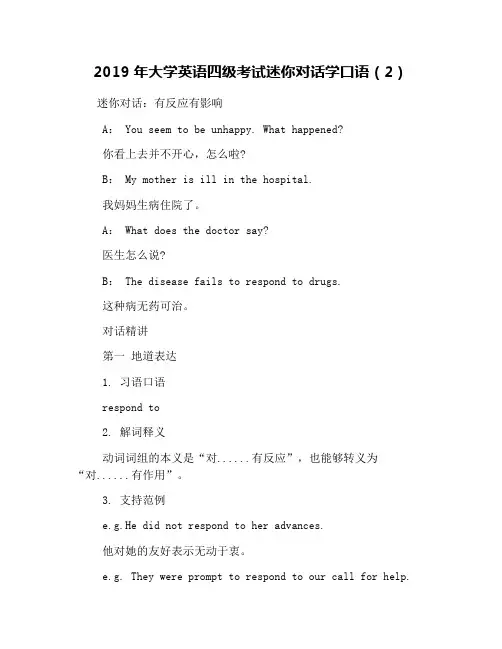
2019年大学英语四级考试迷你对话学口语(2)迷你对话:有反应有影响A: You seem to be unhappy. What happened?你看上去并不开心,怎么啦?B: My mother is ill in the hospital.我妈妈生病住院了。
A: What does the doctor say?医生怎么说?B: The disease fails to respond to drugs.这种病无药可治。
对话精讲第一地道表达1. 习语口语respond to2. 解词释义动词词组的本义是“对......有反应”,也能够转义为“对......有作用”。
3. 支持范例e.g.He did not respond to her advances.他对她的友好表示无动于衷。
e.g. They were prompt to respond to our call for help.他们对我们的求助迅即回应。
e.g.How would you respond to John's arguments?你觉得约翰的话如何?e.g.I don't respond to threats.我不怕别人威胁。
第二、词海拾贝fail to:未能e.g.Too many people fail to realize that real communication goes in both directions.很多人不理解真正的交流是有来有往的。
e.g.Words fail to convey our grateful feelings.我们的感激之情非言语所能表达。
e.g.You will be in trouble if you fail to stop at the red light.遇到红灯不停车,你就会倒霉。
e.g.I fail to see any reason why we should worry ourselves about those people.我真不懂我们为什么要替那些人担忧。
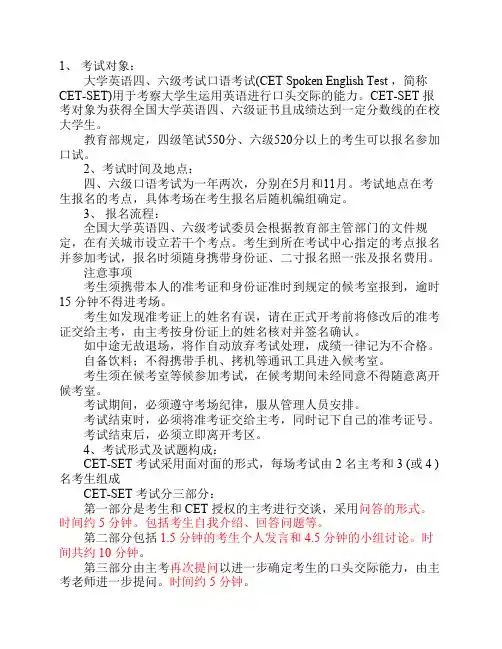
1、考试对象: 大学英语四、六级考试口语考试(CET Spoken English Test ,简称CET-SET)用于考察大学生运用英语进行口头交际的能力。
CET-SET 报考对象为获得全国大学英语四、六级证书且成绩达到一定分数线的在校大学生。
教育部规定,四级笔试550分、六级520分以上的考生可以报名参加口试。
2、考试时间及地点: 四、六级口语考试为一年两次,分别在5月和11月。
考试地点在考生报名的考点,具体考场在考生报名后随机编组确定。
3、报名流程: 全国大学英语四、六级考试委员会根据教育部主管部门的文件规定,在有关城市设立若干个考点。
考生到所在考试中心指定的考点报名并参加考试,报名时须随身携带身份证、二寸报名照一张及报名费用。
注意事项 考生须携带本人的准考证和身份证准时到规定的候考室报到,逾时15 分钟不得进考场。
考生如发现准考证上的姓名有误,请在正式开考前将修改后的准考证交给主考,由主考按身份证上的姓名核对并签名确认。
如中途无故退场,将作自动放弃考试处理,成绩一律记为不合格。
自备饮料;不得携带手机、拷机等通讯工具进入候考室。
考生须在候考室等候参加考试,在候考期间未经同意不得随意离开候考室。
考试期间,必须遵守考场纪律,服从管理人员安排。
考试结束时,必须将准考证交给主考,同时记下自己的准考证号。
考试结束后,必须立即离开考区。
4、考试形式及试题构成: CET-SET 考试采用面对面的形式,每场考试由 2 名主考和 3 (或 4 )名考生组成 CET-SET 考试分三部分: 第一部分是考生和 CET 授权的主考进行交谈,采用问答的形式。
时间约 5 分钟。
包括考生自我介绍、回答问题等。
第二部分包括 1.5 分钟的考生个人发言和 4.5 分钟的小组讨论。
时间共约 10 分钟。
第三部分由主考再次提问以进一步确定考生的口头交际能力,由主考老师进一步提问。
时间约 5 分钟。
5、考试成绩及合格证书: 口语考试成绩合格者由教育部高等教育司发给证书,证书分为 A、B 、C 三个等级,C等以上者将获得由教育部高教司颁发的注有CET Spoken English Test成绩等级的 CET 证书,成绩低于 C 等的不发给证书。

You are right./ You are totally right. 你是对的。
I couldn ' t agree with you more. 太同意了。
It is reasonable. 很合理。
I fully/totally agree with you. 我完全同意。
That ' s sure. 那是一定的。
What you ' ve proposed makes sense. 你说的很有道理。
That ' s just what I want to say. 这也正是我要说的。
Me ,too. 我也是。
So do I. 我也是。
Neither do I. 我也不。
It is a good point. 这一点很对。
表示不同意对方的观点:I ' m afraid I can ' t agree. 恐怕我不能同意。
I ' m afraid that is not what I mean. 我不是那个意思。
I don ' t think you have touched the point. 我觉得你没有说到点子上。
probably you are right, but the fact is that …也许你是对的,但事实是 ... Maybe that ' s where we differ. 这就是我们不同的地方。
It depends. 看情况而定吧。
That ' s not the way I see it. 我不这么看。
If I were you, I would …如果我是你,我会 ......If I were in your shoes, I would …站在你的立场上,我会 ......。
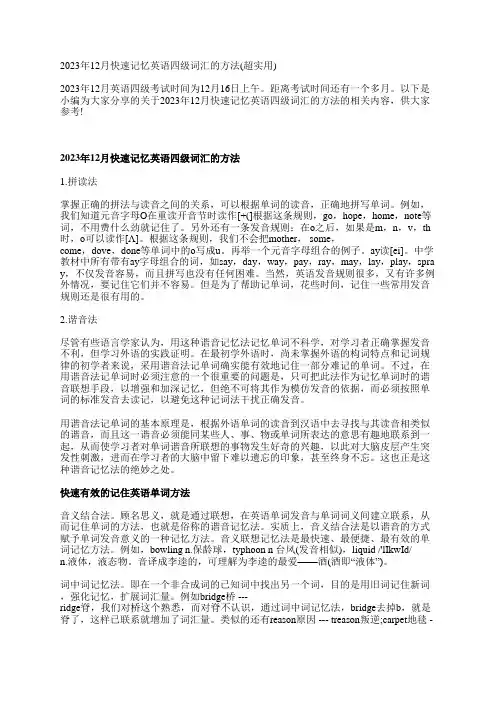
2023年12月快速记忆英语四级词汇的方法(超实用)2023年12月英语四级考试时间为12月16日上午。
距离考试时间还有一个多月。
以下是小编为大家分享的关于2023年12月快速记忆英语四级词汇的方法的相关内容,供大家参考!2023年12月快速记忆英语四级词汇的方法1.拼读法掌握正确的拼法与读音之间的关系,可以根据单词的读音,正确地拼写单词。
例如,我们知道元音字母O在重读开音节时读作[+(]根据这条规则,go,hope,home,note等词,不用费什么劲就记住了。
另外还有一条发音规则:在o之后,如果是m,n,v,th 时,o可以读作[Λ]。
根据这条规则,我们不会把mother, some,come,dove,done等单词中的o写成u。
再举一个元音字母组合的例子。
ay读[ei]。
中学教材中所有带有ay字母组合的词,如say,day,way,pay,ray,may,lay,play,spra y,不仅发音容易,而且拼写也没有任何困难。
当然,英语发音规则很多,又有许多例外情况,要记住它们并不容易。
但是为了帮助记单词,花些时间,记住一些常用发音规则还是很有用的。
2.谐音法尽管有些语言学家认为,用这种谐音记忆法记忆单词不科学,对学习者正确掌握发音不利,但学习外语的实践证明。
在最初学外语时,尚未掌握外语的构词特点和记词规律的初学者来说,采用谐音法记单词确实能有效地记住一部分难记的单词。
不过,在用谐音法记单词时必须注意的一个很重要的问题是,只可把此法作为记忆单词时的谐音联想手段,以增强和加深记忆,但绝不可将其作为模仿发音的依据,而必须按照单词的标准发音去读记,以避免这种记词法干扰正确发音。
用谐音法记单词的基本原理是,根据外语单词的读音到汉语中去寻找与其读音相类似的谐音,而且这一谐音必须能同某些人、事、物或单词所表达的意思有趣地联系到一起,从而使学习者对单词谐音所联想的事物发生好奇的兴趣,以此对大脑皮层产生突发性刺激,进而在学习者的大脑中留下难以遗忘的印象,甚至终身不忘。
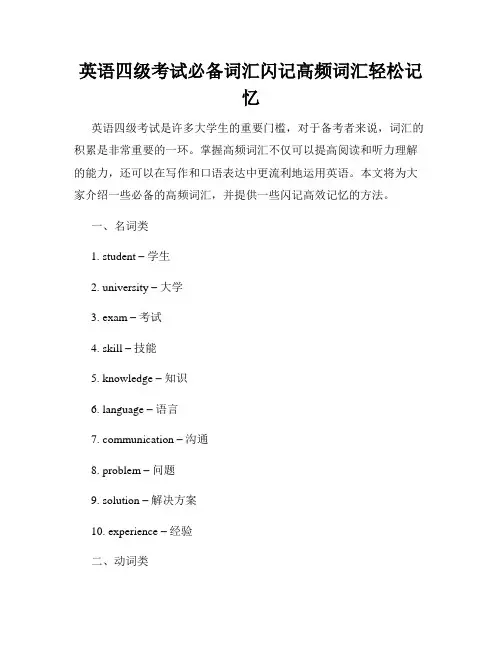
英语四级考试必备词汇闪记高频词汇轻松记忆英语四级考试是许多大学生的重要门槛,对于备考者来说,词汇的积累是非常重要的一环。
掌握高频词汇不仅可以提高阅读和听力理解的能力,还可以在写作和口语表达中更流利地运用英语。
本文将为大家介绍一些必备的高频词汇,并提供一些闪记高效记忆的方法。
一、名词类1. student –学生2. university –大学3. exam –考试4. skill –技能5. knowledge –知识6. language –语言7. communication –沟通8. problem –问题9. solution –解决方案10. experience –经验二、动词类1. learn –学习2. understand –理解3. practice –练习4. improve –提高5. listen –听6. speak –说7. read –读8. write –写9. memorize –记忆10. achieve –实现三、形容词类1. important –重要的2. difficult –困难的3. easy –容易的4. useful –有用的5. necessary –必要的6. confident –自信的7. fluent –流利的8. successful –成功的9. challenging –具有挑战性的10. effective –有效的四、副词类1. always –总是2. often –经常3. usually –通常4. never –从不5. quickly –快速地6. slowly –慢慢地7. easily –容易地8. well –好地9. hard –努力地10. actively –积极地以上是一些常见的高频词汇,掌握了这些词汇,对于应对英语四级考试将大有裨益。
接下来,让我们来谈一谈如何轻松记忆这些单词。
首先,使用闪记卡片是一种常见有效的记忆方法。
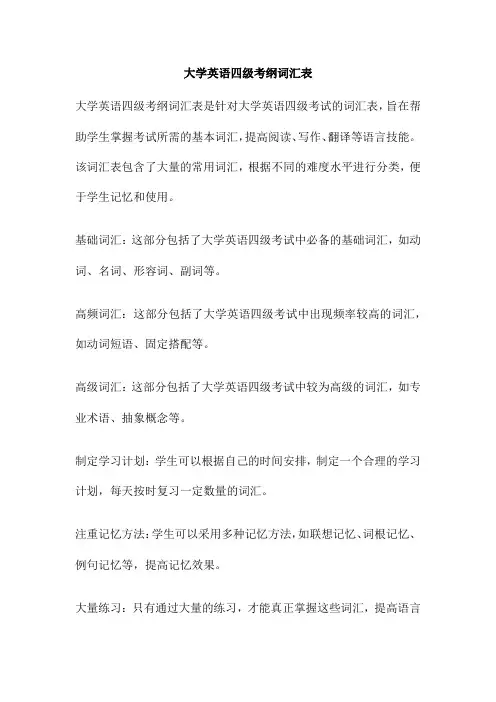
大学英语四级考纲词汇表大学英语四级考纲词汇表是针对大学英语四级考试的词汇表,旨在帮助学生掌握考试所需的基本词汇,提高阅读、写作、翻译等语言技能。
该词汇表包含了大量的常用词汇,根据不同的难度水平进行分类,便于学生记忆和使用。
基础词汇:这部分包括了大学英语四级考试中必备的基础词汇,如动词、名词、形容词、副词等。
高频词汇:这部分包括了大学英语四级考试中出现频率较高的词汇,如动词短语、固定搭配等。
高级词汇:这部分包括了大学英语四级考试中较为高级的词汇,如专业术语、抽象概念等。
制定学习计划:学生可以根据自己的时间安排,制定一个合理的学习计划,每天按时复习一定数量的词汇。
注重记忆方法:学生可以采用多种记忆方法,如联想记忆、词根记忆、例句记忆等,提高记忆效果。
大量练习:只有通过大量的练习,才能真正掌握这些词汇,提高语言技能。
学生可以选择一些历年真题进行练习,熟悉考试形式和难度。
及时复习:学习过的词汇要及时复习,以避免遗忘。
学生可以制定一个复习计划,定期复习已学过的词汇。
扩展词汇量:除了掌握考纲中的词汇外,学生还可以通过阅读、听力等方式扩展自己的词汇量。
大学英语四级考纲词汇表是备考大学英语四级考试的重要工具之一。
通过掌握该词汇表中的词汇,学生可以提高阅读、写作、翻译等语言技能,为顺利通过大学英语四级考试打下坚实的基础。
为了帮助考生顺利通过大学英语四级考试,我们整理了以下核心词汇表。
这些词汇都是在考试中经常出现的高频词汇,对于提高考生的阅读、写作和听力能力有着重要的帮助。
assimilate吸收,理解。
在大学英语四级考试中,词汇表是考生必须掌握的重要部分。
本篇文章将介绍大学英语四级词汇表中的A和Z开头的单词,帮助考生更好地备考。
以上是A开头的部分单词,接下来是Z开头的单词。
以上是Z开头的部分单词。
当然,这只是其中的一部分,考生还需全面学习和掌握其他词汇。
在备考大学英语四级考试时,考生除了掌握单词的拼写和含义外,还需注意单词的用法和搭配。
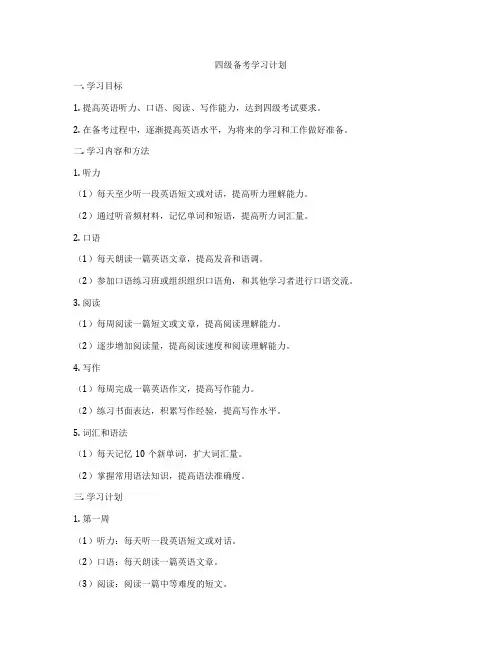
四级备考学习计划一. 学习目标1. 提高英语听力、口语、阅读、写作能力,达到四级考试要求。
2. 在备考过程中,逐渐提高英语水平,为将来的学习和工作做好准备。
二. 学习内容和方法1. 听力(1)每天至少听一段英语短文或对话,提高听力理解能力。
(2)通过听音频材料,记忆单词和短语,提高听力词汇量。
2. 口语(1)每天朗读一篇英语文章,提高发音和语调。
(2)参加口语练习班或组织组织口语角,和其他学习者进行口语交流。
3. 阅读(1)每周阅读一篇短文或文章,提高阅读理解能力。
(2)逐步增加阅读量,提高阅读速度和阅读理解能力。
4. 写作(1)每周完成一篇英语作文,提高写作能力。
(2)练习书面表达,积累写作经验,提高写作水平。
5. 词汇和语法(1)每天记忆10个新单词,扩大词汇量。
(2)掌握常用语法知识,提高语法准确度。
三. 学习计划1. 第一周(1)听力:每天听一段英语短文或对话。
(2)口语:每天朗读一篇英语文章。
(3)阅读:阅读一篇中等难度的短文。
(4)写作:完成一篇短文,主题为介绍自己。
(5)词汇和语法:记忆10个新单词,复习基础语法知识。
2. 第二周(1)听力:每天听一段英语对话或新闻报道。
(2)口语:参加口语练习班,和其他学习者进行口语交流。
(3)阅读:阅读一篇难度适中的文章。
(4)写作:完成一篇英语作文,主题为旅行经历。
(5)词汇和语法:每天记忆10个新单词,复习语法知识。
3. 第三周(1)听力:每天听一段英语新闻报道或讲座。
(2)口语:参加口语角,和其他学习者进行口语练习。
(3)阅读:阅读一篇难度较大的文章,提高阅读水平。
(4)写作:完成一篇英语作文,主题为校园生活。
(5)词汇和语法:每天记忆10个新单词,复习语法知识。
四. 备考准备1. 考前复习(1)针对四级考试内容,进行全面复习。
(2)做真题模拟测试,熟悉考试形式和题型。
2. 考前调整(1)养成良好的生活作息习惯,保证充足的睡眠时间。
(2)保持良好的心态,积极面对考试。
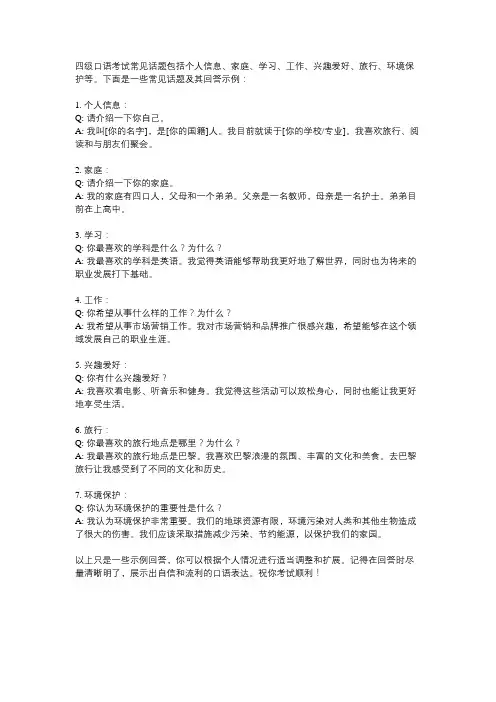
四级口语考试常见话题包括个人信息、家庭、学习、工作、兴趣爱好、旅行、环境保护等。
下面是一些常见话题及其回答示例:1. 个人信息:Q: 请介绍一下你自己。
A: 我叫[你的名字],是[你的国籍]人。
我目前就读于[你的学校/专业]。
我喜欢旅行、阅读和与朋友们聚会。
2. 家庭:Q: 请介绍一下你的家庭。
A: 我的家庭有四口人,父母和一个弟弟。
父亲是一名教师,母亲是一名护士。
弟弟目前在上高中。
3. 学习:Q: 你最喜欢的学科是什么?为什么?A: 我最喜欢的学科是英语。
我觉得英语能够帮助我更好地了解世界,同时也为将来的职业发展打下基础。
4. 工作:Q: 你希望从事什么样的工作?为什么?A: 我希望从事市场营销工作。
我对市场营销和品牌推广很感兴趣,希望能够在这个领域发展自己的职业生涯。
5. 兴趣爱好:Q: 你有什么兴趣爱好?A: 我喜欢看电影、听音乐和健身。
我觉得这些活动可以放松身心,同时也能让我更好地享受生活。
6. 旅行:Q: 你最喜欢的旅行地点是哪里?为什么?A: 我最喜欢的旅行地点是巴黎。
我喜欢巴黎浪漫的氛围、丰富的文化和美食。
去巴黎旅行让我感受到了不同的文化和历史。
7. 环境保护:Q: 你认为环境保护的重要性是什么?A: 我认为环境保护非常重要。
我们的地球资源有限,环境污染对人类和其他生物造成了很大的伤害。
我们应该采取措施减少污染、节约能源,以保护我们的家园。
以上只是一些示例回答,你可以根据个人情况进行适当调整和扩展。
记得在回答时尽量清晰明了,展示出自信和流利的口语表达。
祝你考试顺利!。
英语四级备考技巧及方法如果你想顺利通过大学英语四级考试,你不仅要提高你的词汇量,还要为每一类问题做好准备。
你需要做更多的真题来模拟考试的真实情况,这样你才能在考试中取得好成绩。
下面是我为大家整理的有关英语四级备考技巧及方法汇总,希望对你们有帮助!英语四级真题试卷口语怎么备考英语口语是备考四级过程中最大的一个障碍,想要顺利通过英语四级口语考试。
备考的过程中要掌握方法,下面是我给大家分享的两个方法,大家可以作为参考。
一、英文学习的目的越现实越好很多人在毕业参加工作后想重新学英语,只是为了捡起大学后悔没认真学的英语。
如果是出于这种目的,英语很难学的好。
因为只有出于现实的需要,我们可能才会有动力去学习一门新的技能。
比如你是想找份好的外贸工作,练好英语更容易拿下大单子?你是想参加某某比赛获得奖项?你是想出国留学顺利通过雅思托福考试?这些更为“现实”的目的才值得我们去投入更多的经历。
二、英语输入的深度和广度要一起抓英文中听说读写四项,说是最难的,因为它更考验一个人实际运用语言的能力。
在多年的应试教育下,中国学生的听力和阅读明显比写作和口语更好。
很多我们平时都耳熟能详的东西,真正到了要表达的时候,却感到词穷和没有思绪,只能表达出几分之一的含义。
作为一个大学生学英语,在输入单词和语法的时候,深度和广度要双管齐下。
比如你看到一篇自己很喜欢的英语文章,可以在阅读后掌握每个单词的含义,分析透每个句子的句法,还可以把喜欢的词句发出声来读,感受句子结构和语感。
精读和泛读同时进行才能帮助你保持对英语的兴趣。
以上就是我给大家分享的英语四级口语练习方法,希望可以给大家在备考的过程中带来帮助。
英语四级试卷口语题自我介绍必背词汇1.当被问到你是怎么形容你的性格或者你自己:a:What kind of person would you say you are?b:How would you describe yourself?……Duang!你们可以用得上的相关短语和表达来了,这些都是可以用来形容你的性格的词汇噢:Introverted/extroverted/outgoing (extroverted和outgoing优先使用更高词汇,但是使用前务必确认你的单词读音哈~)Optimistic/pessimistic (好一对“乐观”与“悲观”的姐妹花) ;conversable/quiet;active /passiveRestless/aggressive/enterprising/ambitious;Considerate/thoughtful(体贴的,善解人意的);understanding(有理解力的,聪明的)Calm/impulsive;Careful/meticulous/careless温馨提示:尽量使用积极的词汇。
英语四级口语考试问答模板以下是英语四级口语考试的问答模板,可以参考:问: What do you think of English?答: English is a very important language today. It is the language of international trade and tourism. It is also the language of the Internet. English is widely used in many fields, such as science, technology,and economy. I think English is very useful for everyone.问: What are the best ways to learn English?答: There are many ways to learn English, such as reading,writing, listening, speaking, and watching English movies. I think the best way to learn English is to practice as much as possible. You can join an English study group or find a language exchange partner. You can also try to speak English with native speakers. These methods can help you improve your English skills.问: What is the difference between American and British English?答: American and British English have some differences in vocabulary,grammar,pronunciation,and spelling. For example,American English uses "Fall" to describe the season between summer and winter, while British English uses "Autumn". In addition,British English often ends a sentence with a question mark, while American English often uses a period. These differences may cause some confusion, but they do not affect communication between people from different countries.问: What is the most difficult part of learning English?答: The most difficult part of learning English is probably speaking. Many people find it difficult to speak English fluently and naturally because they are afraid of making mistakes or sounding strange. To improve your English speaking skills, you need to practice speaking as much as possible and not be afraid of making mistakes. You can also try to join an English speaking group or find a language exchange partner to practice with.希望以上问答模板对你有所帮助。
英语四级口语考试练习小积累(一)The reason why people give up so fast is that they tendto look at how far they still have to go, instead of how far they have gotten.人们为什么轻言放弃?因为他们仅仅看到前方路途遥远,而忘记了身后的一路坚持。
重点解析:tend to do 倾向于做某事例句:We tend to make mistakes when we do things in a hurry.忙中不免出错。
练完以上四级口语以后,考生要注意总结记忆了,考试时遇到类似的内容就再也不怕了。
口语练习二Life will inevitably encounter setbacks and failures, and with tears wash regret, as with a smile to meet newchallenges.人生难免要遭遇挫折与失败,与其用泪水洗刷悔恨,不如用微笑去迎接新的挑战。
重点解析:setback n.挫折; 防碍; 退步; 逆流例句:It is an unexpected setback in her fortunes.这是她好运中的一次意外的挫折。
以上关于挫折与失败的四级口语练习题,相信大家都能轻松掌握,等待大家考试时候的精彩发挥!口语练习三口语都是从最基础的生活场景中实行练习,生活中任何一件小事都能够拿来练习英语口语,下面就是一篇关于打电话的四级口语练习,来张嘴练练吧我是丹尼斯史密斯。
This is Dennis Smith. *打电话时常用This is……代替My name is……。
This is Dennis Smith speaking.喂,是约翰吗?Hello, John? *常用于熟人之间。
喂,请问是丹尼斯史密斯先生吗?Is this Mr. Dennis Smith?请问是财务科吗?Is this the finance department?请问是吉姆贝克医生的办公室吗?Is this Dr. Jim Baker's office?我能借用一下您的电话吗?Do you mind if I use your phone? *这句话直译是“如果我用一下您的电话,您介意吗?”。
大学英语四级口语考试技巧(通用)金融英语口语词汇的中英对照篇一1. deposit bank 存款银行2. deposit money 存款货币3. deposit rate 存款利率4. deposit turnover 存款周转率5. depreciation risks 贬值风险6. derivative deposit 派生存款7. derived deposit 派生存款8. designated currency 指定货币9. die intestate 死时没有遗嘱10. devaluation of dollar 美元贬值11. direct exchange 直接汇兑12. Development Bank 开发银行13. development financing 发展融资14. devise 遗赠如何练习英语口语篇二1、话题练习法话题练习法的集体做法是针对其中一个话题发表自己的看法,这种练习方法也同样应用广泛。
学生们在任何新闻媒体上看到或听到评论性的言论后,都可以针对这个话题用英语提出自己的观点,并组织论据支撑自己的观点。
学生们也可以使用话题作文书来练习,把作文题目当成口语练习的话题,在反复进行口语话题练习法之后再整理成书面形式的话题作文,这样就不仅提高了口语能力,还大大提高了英语写作能力。
2、“自问—自答”法对于一般的课文和其它一些普通的阅读资料,大学生可采取“自问—自答”法进行练习。
具体做法是先看课文的标题,或是一篇新闻的标题,或是一篇散文的题目,之后针对这个题目在自己可想到的范围内先预设几个问题,或是关于主题的,或是关于写作目的的,或是针对其结构安排的,然后在阅读过程中练习者肯定会发现文章与自己预设的内容有不一样的地方,这就要随时更改预设的问题。
练习者可以一边进行英文阅读,一边用英语自己解答自己预设的问题,这样不仅可以练习英语口语表达的流利性,更能有效地学习所阅读的文章,因为带着问题阅读使阅读更有针对性,而实时用英语回答自己的问题,就有效地使读和说有机地结合了起来,使记忆更牢固,也使书本上的知识成功地转化为了自己灵活运用的能力。
如何准备英语四级口语考试英语四级口语考试是许多大学生必须面对的一项考试。
一个好的口语表达能力对于提高整体英语水平以及为将来的就业做好准备都非常重要。
下面将为您介绍一些准备英语四级口语考试的方法和技巧。
一、了解口语考试形式英语四级口语考试通常分为两个部分:个人陈述和问答。
在个人陈述中,考生需要根据给定的话题提供自己的观点或者分享自己的经验;在问答部分,考生需要回答考官的问题。
了解考试形式有助于我们对备考有一个清晰的思路。
二、扩充词汇量词汇量是英语口语考试的基础。
通过词汇量的扩充,我们可以更准确地表达自己的意思,并且使对话更加流利。
可以通过背单词、阅读英语文章、看英语电影等方式来增加词汇量。
另外,在备考过程中,我们还可以整理出一些常用的口语表达,以便在考试中顺利运用。
三、练习口语对话熟能生巧,只有通过大量的练习才能提高口语表达能力。
可以与同学、老师或者英语角的朋友进行练习对话,模拟真实的考试环境。
在练习过程中,可以注意自己的语音语调、语法运用、连贯性和逻辑性等方面的问题,并及时进行纠正。
四、多听、多看、多说、多写多听英语新闻、英语电影和英语歌曲,可以帮助我们更好地理解英语的口语表达习惯和运用方式。
多看一些有关口语技巧的书籍和资料,可以提供一些备考的方法和技巧。
多说和多写可以帮助我们更好地提高口语表达的能力和语法运用的准确性。
五、逐步提升口语自信自信心对于英语口语考试来说是非常重要的。
在备考过程中,我们可以通过多积累资料、熟悉考试形式和练习口语对话来提高自己的自信心。
同时,我们也要相信自己的口语能力是可以不断提升的,只要多加练习和努力,一定能够取得好的成绩。
在英语四级口语考试中,充分了解考试形式,扩充词汇量,练习口语对话,多听、多看、多说、多写以及逐步提升口语自信都是准备口语考试的有效方法。
通过不断的努力和练习,大家一定能够在口语考试中取得好成绩。
加油吧!。
2016英语四级口语考试练习技巧1、练就“假嗓子”功夫:说明:说英语时,声音浑厚,富有磁性,听起来像外国人操作:每天跑步10 分钟,一边跑步一边有节奏地喊1234,坚持10 天见效果哦。
2、增强舌头的柔韧度:说明:改掉一个一个单词说英语的习惯,流利说出顺畅英语。
操作:把 pike it up,check it out 读成一个单词,一口气说出最多次数。
3、自信朗读每个英文单词:内容:看见单词,能即刻默写出它的音标;看到音标,能猜出单词操作:每天挑选30 个长单词,先誊写音标,然后默写单词音标。
4、清晰地说标准英语:说明:双元音饱满,长音足够长,读准咬舌音、唇齿音,吐字清晰操作:每天读一段必须带有音标的文章,速度越慢越好,发音务必准确。
5、模仿训练:内容:模仿经典英文,美化英语语调,模仿外国人说英语操作:模仿美国总统经典演讲;模仿英美电影经典台词(功夫熊猫)。
6、学习趣味英语:内容:通过英文谚语、英文简称等典型词语了解英语趣味文化操作:英文简称:family;TCL;BMW;英文谚语: give me a five。
7、装老外说英文和中文:内容:用假嗓子学美国人说英文和中文;fake it until you make it 操作:ladies and gentlemen,this is VOA special English。
8、用英语体现感情:内容:富有情感地说英语,记住,交流传递的不是语言而是情感操作:hey,man,shut up,get out here; I love you,honey!9、时时处处说英语:内容:英语是一门语言,语言是用来交流的,说出来的英语才是真英语操作:和 partner 练习;去英语角练习;参加英语演讲比赛;找外国人交流。
英语四级口语考试练对话记单词(6) A: What is your current occupation?
B: I am an apprentice electrician but I will be
qualified in two months.
apprentice
n.学徒,徒弟
A: Your shirt is filthy.
B: Oops, I was cooking but did not have an apron.
apron
n.1.围裙;2.台口(舞台幕前的突出部分) ;3.停机坪
A: Your comment about inefficient train service was most apt. I have been waiting in this platform for half an hour.
B: Oh, not quite. Here comes the train now.
apt
a.1.易于,有(做某事的)倾向 ;2.恰当的,适宜的 ;3.聪明的,反应敏捷的
A: Did you get into the university course that you applied for?
B: Well, I have to pass an aptitude test first, and then if I am successful I will be admitted.
aptitude
n.(学习方面的)才能,资质,天资
A: That is a beautiful bridge.
B:Yes, it’s in the shape of an arc.
arc
n.1. 弧形(物) ;2.弧 ;3.电弧,弧光
A: The new town hall is now completed.
B: Yes, I saw it , and the front arches look really beautiful.
arch
n.拱,拱门,拱形(结构)
v.(使)成拱形
a.调皮的,淘气的
A: I am very interested in buried ruins and treasures.
B: You should study archaeology.
archaeology
n.考古学
A: It is my ardent wish to travel around the world.
B: You better start saving your money now.
ardent
a.热心的,热情的,热烈的
A: The concert will take place in the main arena .
B: Wow, it will be huge. I know it can hold 30,000 people.
arena
n.1.表演场地,竞技场 ;2.活动场所
A: Mr. Smith was an aristocrat and owned a large piece of land in the south of the country.
B: Does that mean that he was also very wealthy?
apprehend
vt.逮捕,拘押,领会,理解
A: What is your current occupation?
B: I am an apprentice electrician but I will be
qualified in two months.
apprentice
n.学徒,徒弟
A: Your shirt is filthy.
B: Oops, I was cooking but did not have an apron.
apron
n.1.围裙;2.台口(舞台幕前的突出部分) ;3.停机坪
A: Your comment about inefficient train service was most apt. I have been waiting in this platform for half an hour.
B: Oh, not quite. Here comes the train now.
apt
a.1.易于,有(做某事的)倾向 ;2.恰当的,适宜的 ;3.聪明的,反应敏捷的
A: Did you get into the university course that you applied for?
B: Well, I have to pass an aptitude test first, and then if I am successful I will be admitted.
aptitude
n.(学习方面的)才能,资质,天资
A: That is a beautiful bridge.
B:Yes, it’s in the shape of an arc.
arc
n.1. 弧形(物) ;2.弧 ;3.电弧,弧光
A: The new town hall is now completed.
B: Yes, I saw it , and the front arches look really beautiful.
arch
n.拱,拱门,拱形(结构)
v.(使)成拱形
a.调皮的,淘气的
A: I am very interested in buried ruins and treasures.
B: You should study archaeology.
archaeology
n.考古学
A: It is my ardent wish to travel around the world.
B: You better start saving your money now.
ardent
a.热心的,热情的,热烈的
A: The concert will take place in the main arena .
B: Wow, it will be huge. I know it can hold 30,000 people.
arena
n.1.表演场地,竞技场 ;2.活动场所。